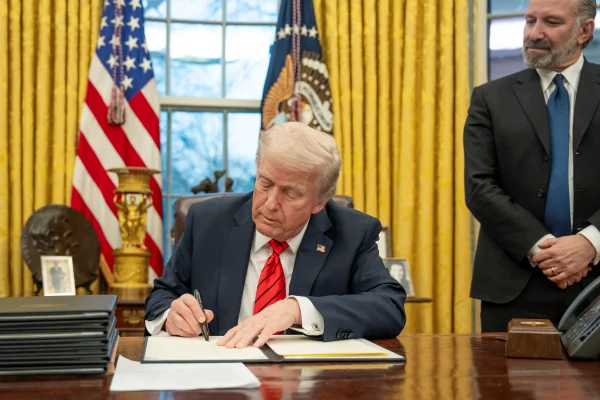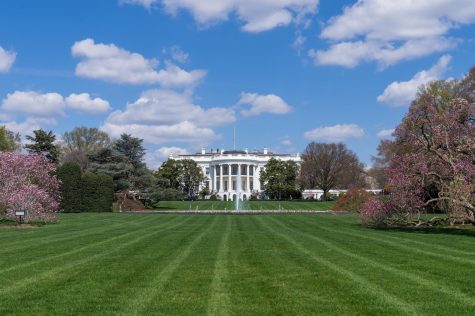The Past, Present, and Future of Crypto

One day you may be paying for your coffee with crypto, so learn about it now before you hold up the line.
The first crypto currency, Bitcoin, was released January 3, 2009 by a pseudonymous person called Satoshi Nakamoto, according to a September 1, 2020 U.S News article by Coryanne Hicks. Bitcoin is run on a database system called a blockchain. Bitcoin’s blockchain is run by a system of computers owned by individuals, who are called miners.
Miners connect their computers to the Bitcoin blockchain to solve complex math equations and validate transactions and receive Bitcoin in exchange for their work, according to Investopedia. Once a Bitcoin transaction is processed, it is stored on the blockchain with all details available to the public.
A year after its release, the first Bitcoin transaction occurred when a man paid 10,000 coins, worth around $25 at that time, for two Papa Johns pizzas, according to a February 10, 2021 Bloomberg article by Olga Kharif.
That same 10,000 in Bitcoin is now worth $464,179,000.00 as of 1/5/22.
Unlike the U.S dollar, Bitcoin has a fixed number of coins in existence, 21 million, according to a Nov. 15, 2021 Motley Fool article by Katie Brockman. Because of this finite supply of coins, many investors see Bitcoin as a way to hedge inflation because, so far, its value has only increased with higher inflation.
Bitcoin’s ability to hold value while the U.S dollar falls subject to inflation is one of the biggest reasons behind investment by retail traders, according to a August 24, 2021 CNBC article by Carmen Reinicke.
Many famous investors are jumping on the cryptocurrency bandwagon, including Shark Tank Star Kevin O’Leary, who has almost 10% of his net worth in crypto currencies including Bitcoin, according to a Nov. 14 2021 Bitcoin.com article by Kevin Helms. Crypto is not only considered a hedge against inflation, but future potential applications of crypto including its use as a document notarizing tool and as an actual currency has many pouring their money into the coins, including Williston students.
Luke Green, and eighth grader, like many investors, took a position in crypto because of its ability to hold value and its extremely useful future applications.
“I truly believe … crypto will take over centralized currencies that have no cap for inflation like the U.S. dollar. I suspect some cryptos will [solely] be used [to hold] value, like Bitcoin and Litecoin …” he said. “Some cryptos will be and are ideal for exchanging NFTs and decentralized tokens… with quick transaction rates, cryptos like Ethereum and Cardano will excel in this part of [decentralized finance.]”
Zach Pincus, a sophomore and Investment Club Treasurer, is optimistic on the outlook of cryptocurrencies, noting that businesses including KFC, Virgin, Norwegian Air, and Microsoft already accept Bitcoin.
“I believe crypto wallets or cards will essentially take the place of debit cards in the future,” he said.
Despite the engagement from many young investors, there are considerations to make before treating crypto as a true currency or investment according to Teddy Schaffer, Economics teacher.
“From a macroeconomic standpoint, central banks are critical to all current economies. Central banks, like the Federal Reserve, have some level of control over the amount of money in an economy,” Schaffer said. “If cryptocurrencies are entirely outside of the realm of government or central bank, that could make fluctuations (like recessions or stagflation) much more of a risk,” he said. “The size of the money supply in the USA is largely determined by banks making loans. [Will] banks be able to make loans of crypto?”
Crypto is gaining popularity at an exponential rate, with one in 10 people currently investing in crypto currencies, according to a August 24, 2021 CNBC article by Carmen Reinicke. Adding on to this hype, the Los Angeles Staples Center was just renamed to the Crypto.com Arena.. With many interested in the space and so much information available on the internet, what do the experts think?
The Willistonian spoke with Matt Zeigler, a financial advisor for Merrill Lynch, who says that his company is holding off from recommending crypto as an investment.
“At this time Bank of America Merrill Lynch is not directly recommending or advising on cryptocurrency investments, but that’s largely because of how new the space still is. Bitcoin has been around since [2009,] but the first regulations only appeared in 2014,” he said. “The key takeaway here is to notice how regulations are legitimizing the space. The more regulated crypto currencies become, the more likely it is investors will start to receive advice.”
Crypto is appearing more and more in government discussions. Most recently, in a November 1, 2021 report by the U.S Department of The Treasury, Janet Yellen, Secretary of the Treasury, shared her worries about Stablecoins, a form of crypto currency that pegs its value to fiat currencies such as the U.S, dollar or assets like gold.
“Stablecoins that are well-designed and subject to appropriate oversight have the potential to support beneficial payments options. But the absence of appropriate oversight presents risks to users and the broader system,” she said.
Such risks, according to the report include: “…potential for destabilizing runs, disruptions in the payment system, and concentration of economic power.” Yellen plans to prevent these risks through legislation that will require stable coin issuers to become insured depository institutions.
As the federal government proposes more legislation for crypto currencies, their adoption by major banks and corporations may become more prevalent causing for crypto to go mainstream.
With so much happening in the crypto world every day, Zeigler recommends to be a well informed investor.
“Whether you are investing in cryptocurrencies or not, this is a great time to learn. Go out and explore, because much like [how] the internet changed everything in the 90’s and 2000’s, there’s a real chance cryptocurrencies could change the global financial landscape in the 2020’s and 2030’s,” he said. “If that’s the case, curiosity is the single greatest advantage we can possess. Asking questions, reading up on how these things work, and learning to separate hype from smart risk taking is the name of the game.”










